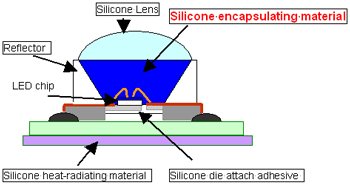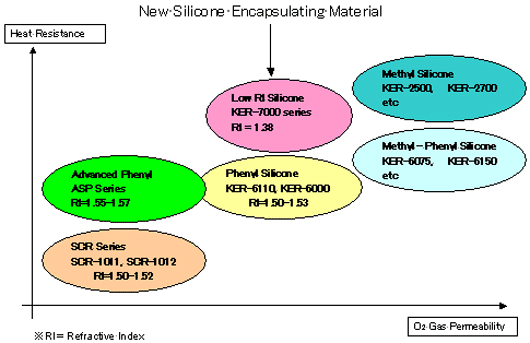- News
17 February 2012
Shin-Etsu Chemical develops low-refractive-index silicone encapsulating material with reduced gas permeability to improve HB-LED reliability
 Tokyo-based Shin-Etsu Chemical Co Ltd has developed the KER-7000 Series, a low refractive index (RI)-type silicone encapsulating material product that greatly reduces gas permeability for applications in high-brightness light-emitting diode (HB-LED) packaging materials. The firm is beginning sample shipments, mainly for applications in LED lighting.
Tokyo-based Shin-Etsu Chemical Co Ltd has developed the KER-7000 Series, a low refractive index (RI)-type silicone encapsulating material product that greatly reduces gas permeability for applications in high-brightness light-emitting diode (HB-LED) packaging materials. The firm is beginning sample shipments, mainly for applications in LED lighting.
Low gas permeability is one of the important characteristics sought in LED encapsulating material, along with photo-thermal stability in withstanding high temperatures and excellent retention of its initial optical transparency throughout the lifetime of the device. With an encapsulating material that has high gas permeability, it is known that gases such as oxygen can easily permeate and cause oxidation and sulfuration to occur, and that can lead to the possibility of degradation in light intensity.
Up to now, Shin-Etsu Chemical has developed many silicone encapsulating materials with various characteristics, such as methyl-group material (superior in heat resistance) and phenyl-group material (characterized by low gas permeability). The new product reduces the level of gas permeability by 1/10 while maintaining heat resistance at the same level as that of the methyl-group. In addition, compared with the phenyl group, it has the same level of gas permeability and much higher resistance to high temperatures. LED packaging materials that apply this product can yield much improved reliability of LED lighting, it is claimed, because of its effectiveness in preventing the degradation of light intensify caused by the corrosion of the peripheral materials.

Because the new product has a refractive index of 1.38 (lower than that of the methyl-group material) and is superior in transparency, it is a particularly attractive encapsulating material for flat-package HBLEDs. There are two types of products in this new series that are formulated based on different hardness properties: KER-7080 A/B has a hardness level of (Durometer A) 80, and KER-7030 A/B has a hardness level of (Durometer A) 30.
